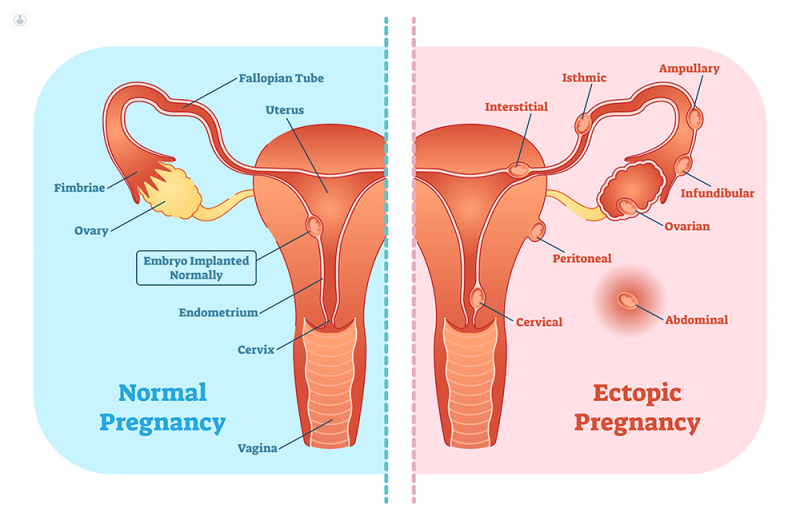Understanding the difference miscarriage ectopic pregnancy treatment
Escrito por:About 15-20% of pregnancies result in a miscarriage. Ectopic pregnancies are much less common, occurring on average in just over 1% of pregnancies. They have similar symptoms, making it difficult to differentiate between them without seeing a specialist. They are also treated quite differently.
Dr Shahla Ahmed is a leading consultant gynaecologist in London with a special interest in early pregnancy assessment, including the management of miscarriages and ectopic pregnancies. She explains what these conditions are and how you can tell them apart.

What are the signs of problems in early pregnancy?
Most problems in early pregnancy show up as bleeding, with or without pain. Sometimes, there is a loss of pregnancy symptoms, such as reduced nausea and vomiting, or reduced breast tenderness.
Miscarriages
What is a miscarriage?
A miscarriage is where the fetus has passed away in the womb.
What are the signs of a miscarriage?
Bleeding is the most common sign. This can be very light, and either pink or brown. It can also be heavy, like a period, and contain clots. The heavier the bleeding, the greater the risk of miscarriage. Pain and bleeding can occur at any stage of pregnancy; however, most miscarriages occur before 12 weeks. Although heavy bleeding usually signals a miscarriage, a miscarriage can also occur with minimal or even no bleeding at all. Once the fetus has passed away, the body will naturally attempt to expel it, hence the pain and bleeding that will follow. This usually occurs fairly soon after the fetus passes away, but there can be a delay of days or even weeks.
In a natural miscarriage, the bleeding is usually heavy with clots, like a heavy period. Miscarriages that are delayed can be treated with medication to bring on the bleeding and expel the fetus, or by surgery.
Can a miscarriage be reversed?
Sadly, no. Since a miscarriage occurs when the fetus has passed away, it cannot be reversed.
Ectopic Pregnancies
What is an ectopic pregnancy?
An ectopic pregnancy is where the fetus is growing outside the womb. More than 90% of ectopic pregnancies occur in the fallopian tube. It can also occur in an ovary, the cervix or a caesarean section scar, although this is rare/uncommon. An ectopic pregnancy cannot be transplanted into the womb to continue to develop normally, and so must always be treated, usually by removing the pregnancy.

In the past, all ectopic pregnancies were treated surgically by removing the affected fallopian tube or ovary. There are now other treatment options, such as injected medication, but these treatment decisions are made on a case-by-case basis.
What are the signs of an ectopic pregnancy?
A light pink or brown bleed, particularly if associated with pain, can be an early sign of an ectopic pregnancy.
In rare cases, the pregnancy may rupture through the fallopian tube, ovary or caesarean scar and cause severe pain, with the patient feeling faint and dizzy and experiencing pain in the shoulder. This is a medical emergency; if you experience these symptoms, please go directly to A&E.
Where can you get treatment?
Early Pregnancy Assessment Units These units see and treat women with pregnancy problems such as pain and bleeding. They also treat women suffering from severe vomiting or anything else that has developed that may be pregnancy- or gynaecology-related, such as abnormal vaginal discharge or recurrent urinary infections.
What happens at an Early Pregnancy Assessment Unit?
You will be seen by a qualified specialist nurse or a doctor. An ultrasound scan may be performed; either an internal (vaginal) scan for earlier pregnancies or through the abdomen. These scans help us to make a diagnosis; they do not affect the pregnancy and do not cause miscarriage.
Further tests may be required, e.g. blood or urine tests, and a treatment plan will be drawn up for you with follow-up appointments as required.
To make an appointment with Dr Shahla Ahmed, visit her Top Doctors profile and check her availability.


